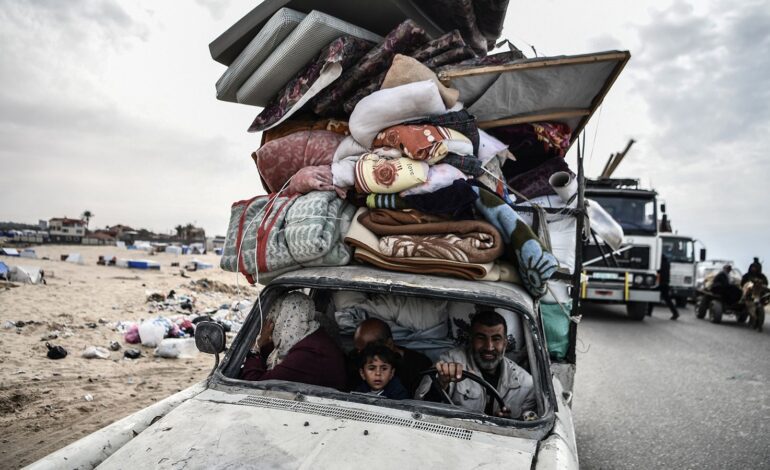UNITED NATIONS – On Tuesday, the United Nations warned against an Israeli ground invasion of Rafah in the Gaza Strip, saying an offensive could “lead to a slaughter” in the southern region of the Palestinian enclave where more than 1 million people are sheltering.

Martin Griffiths, under-secretary-general for humanitarian affairs and emergency relief coordinator

Tent camps of displaced Palestinians in Rafah in the southern Gaza Strip close to the border with Egypt in December. File photo by AFP
Biden’s options to prevent “catastrophic” Rafah invasion as international pressure mounts
Over the weekend, Biden told Israeli Prime Minister Netanyahu that the potential ground invasion “should not proceed” without a plan to ensure civilian safety. On Monday, Biden repeated the sentiment.
National Security Council spokesperson John Kirby was even more direct today: “A major operation in Rafah would be a disaster” without a plan to protect civilians, he said.
“We’re continuing to talk to our Israeli counterparts about what that plan might look like,” he added.
But the White House isn’t planning to punish Israel if it launches a military campaign in Rafah without ensuring civilian safety, as NatSec Daily reported Tuesday.
Still, if Biden wants to take action in response to a Rafah invasion, there are a few things he could do. We dug through some of the administration’s past actions to consider what might be on the table:
- The U.S. could become tougher on Israel when it comes to the West Bank, issuing more sanctions and possibly targeting Israeli far-right ministers who have called for the expulsion of Palestinians from Gaza and rebuilding Israeli settlements there. The administration has already imposed sanctions to punish Israeli settlers who have been attacking Palestinians in the occupied West Bank.
- Washington could withhold support for Israel at the United Nations if a resolution comes up. While the U.S. has a long history of blocking U.N. resolutions against Israel, the Biden administration is facing international pressure to take a harder line on Israel at the U.N.
- The White House could slow down military assistance in general. The administration already announced new guardrails for military assistance to allies after lawmakers blasted it for skirting Congress to greenlight weapons shipments. But Biden has avoided calls for the U.S. to condition aid to Israel.
- Citing the humanitarian crisis in Rafah, Biden could re-start funding to the U.N. Relief and Works Agency, which saw top donors pause funding after Israel alleged that several staffers took part in abductions and killings during Hamas’ Oct. 7 attack. The U.S. government has given nearly $1 billion to UNRWA in the past three years, including $296 million in 2023 alone, indicating how important the agency’s work is.
- The White House could call for a permanent cease-fire. That’s unlikely as it still believes in Israel’s goal of destroying Hamas. Biden has instead pushed for humanitarian pauses. But a Rafah invasion has the potential to cause the number of civilian casualties to jump sharply, which could up pressure on the Biden administration to reconsider.
There’s no indication Biden will do any of these things, but it shows he does have some tools at his disposal short of cutting off or conditioning military assistance to Israel, as some progressive lawmakers have suggested. The National Security Council didn’t respond to NatSec Daily’s request for comment.






Leave a Reply